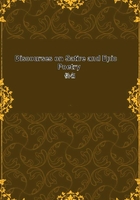1. Thus far concerning the Nature of Man, and the constitution and properties of a Body Politic. There remaineth only for the last chapter, to speak of the nature and sorts of law. And first it is manifest, that all laws are declarations of the mind, concerning some action future to be done, or omitted.
And all declarations and expressions of the mind concerning future actions and omissions, are either promissive, as I will do, or not do; or provisive, as for example, If this be done or not done, this will follow; or imperative, as Do this, or do it not. In the first sort of these expressions, consisteth the nature of a covenant; in the second, consisteth counsel; in the third, command.
2. It is evident, when a man doth, or forbeareth to do any action, if he be moved thereto by this only consideration, that the same is good or evil in itself; and that there be no reason why the will or pleasure of another should be of any weight in his deliberation, that then neither to do nor omit the action deliberated, is any breach of law. And consequently, whatsoever is a law to a man, respecteth the will of another, and the declaration thereof. But a covenant is the declaration of a man's own will. And therefore a law and a covenant differ; and though they be both obligatory, and a law obligeth no otherwise than by virtue of some covenant made by him who is subject thereunto, yet they oblige by several sorts of promises. For a covenant obligeth by promise of an action, or omission, especially named and limited; but a law bindeth by a promise of obedience in general, whereby the action to be done, or left undone, is referred to the determination of him, to whom the covenant is made. So that the difference between a covenant and a law, standeth thus: in simple covenants the action to be done, or not done, is first limited and made known, and then followeth the promise to do or not do; but in a law, the obligation to do or not to do, precedeth, and the declaration what is to be done, or not done, followeth after.
3. And from this may be deduced, that which to some may seem a paradox: that the command of him, whose command is a law in one thing, is a law in every thing. For seeing a man is obliged to obedience before what he is to do be known, he is obliged to obey in general, that is to say, in every thing.
4. That the counsel of a man is no law to him that is counselled, and that he who alloweth another to give him counsel, doth not thereby oblige himself to follow the same, is manifest enough; and yet men usually call counselling by the name of governing; not that they are not able to distinguish between them, but because they envy many times those men that are called to counsel, and are therefore angry with them that are counselled. But if to counsellors there should be given a right to have their counsel followed, then are they no more counsellors, but masters of them whom they counsel; and their counsels no more counsels, but laws. For the difference between a law and a counsel being no more but this, that in counsel the expression is, Do, because it is best; in a law, Do, because I have right to compel you; or Do, because I say, do: when counsel which should give the reason of the action it adviseth to, becometh the reason thereof itself, it is no more counsel, but a law.
5. The names lex, and jus, that is to say, law and right, are often confounded; and yet scarce are there any two words of more contrary signification. For right is that liberty which law leaveth us; and laws those restraints by which we agree mutually to abridge one another's liberty. Law and right therefore are no less different than restraint and liberty, which are contrary; and whatsoever a man doth that liveth in a commonwealth, jure, he doth it jure civili, jure naturae, and jure divino. For whatsoever is against any of these laws, cannot be said to be jure. For the civil law cannot make that to be done jure, which is against the law divine, or of nature. And therefore whatsoever any subject doth, if it be not contrary to the civil law, and whatsoever a sovereign doth, if it be not against the law of nature, he doth it jure divino, by divine right. But to say, lege divina, by divine law, is another thing. For the laws of God and nature allowing greater liberty than is allowed by the law civil (for subordinate laws do still bind more than the superior laws, the essence of law being not to loose, but to bind): a man may be commanded that by a law civil, which is not commanded by the law of nature, nor by the law divine. So that of things done lege, that is to say, by command of the law, there is some place for a distinction between lege divina and lege civili. As when a man giveth an alms, or helpeth him that is in need, he doth it not lege civili, but lege divina, by the divine law, the precept whereof is charity. But of things that are done jure, nothing can be said done jure divino, that is not also jure civili, unless it be done by them that having sovereign power, are not subject to the civil law.
6. The differences of laws are according to the differences, either of the authors and lawmakers, or of the promulgation, or of those that are subject to them. From the difference of the authors, or lawmakers, cometh the division of law into divine, natural, and civil. From the difference of promulgation, proceedeth the division of laws into written and unwritten. And from the difference of the persons to whom the law appertaineth, it proceedeth, that some laws are called simply laws, and some penal. As for example: thou shalt not steal, is simply a law; but this: he that stealeth an ox, shall restore four-fold, is a penal, or as others call it, a judicial law. Now in those laws, which are simply laws, the commandment is addressed to every man; but in penal laws the commandment is addressed to the magistrate, who is only guilty of the breach of it, when the penalties ordained are not inflicted; to the rest appertaineth nothing, but to take notice of their danger.















